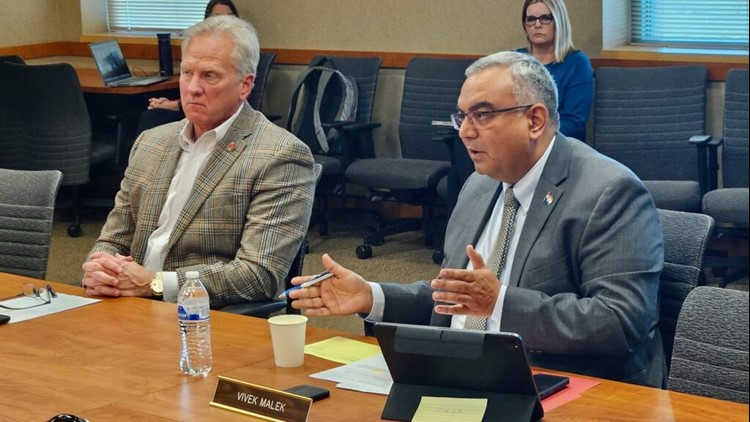JEFFERSON CITY, Mo. — The board overseeing Missouri’s largest state employee pension fund voted Tuesday to sell most of its investments in Chinese-owned companies, reversing a decision it made last month.
The divestment by the Missouri State Employees Retirement Fund will take place over the next 12 months, with an allowance to stretch that to 36 months to avoid financial losses as investments are sold.
In a special meeting called at the urging of Gov. Mike Parson, the 11-member MOSERS Board of Trustees voted 9-2 in favor of the motion by state Treasurer Vivek Malek to sell the stocks and other investments. Only former MOSERS Executive Director Gary Findlay, elected to the board to represent retirees, and state Sen. John Rizzo, one of four legislators on the board, opposed the motion.
Rizzo accused Malek of playing politics with state investments to boost his chances in the 2024 Republican primary for his office. Malek took office in January and faces at least two well-funded opponents next year.
“I don’t think I’m a fiduciary, being a good steward of this pension fund, by voting to divest ourselves from China for no reason other than somebody needs a mail piece to run on the campaign,” Rizzo said.
Malek denied that he was opposed to Chinese investments for political reasons.
“I believe that decision should be divest from China because of the level of risk that is contrary to the interests of our time,” Malek said.
Early Tuesday evening, in a mass email to supporters, Malek’s campaign trumpeted the vote as a victory “protecting taxpayer money from the risks associated with investing in a nation that has repeatedly proven adversarial.”
During the meeting, Malek argued that economic problems in China, along with its aggressive posture toward Taiwan and friendship with Russia, are all good reasons for divesting. The board voted in March 2022, just days after the invasion of Ukraine, to sell its assets with Russia ties. At the time, the value of those investments had been reduced to where they were essentially worthless.
There have been two other times the board has used divestment as a political statement.
In 2007, at the urging of then-state Treasurer Sarah Steelman, the MOSERS board voted to divest from investments in companies doing business with Iran and other countries identified by the State Department as state sponsors of terrorism.
And in June 1987, a new state law targeting the racist apartheid regime in South Africa required all pension and other public funds to divest from South African banks, companies with business locations, franchises or license agreements in South Africa and any other business with 5% or greater ownership by a South African firm.
During the board’s debate, Rizzo noted that when the current investments are sold, the money could be put into Apple, General Motors or other companies doing extensive business in China.
Asked after the meeting why his motion wasn’t as broad as the divestment from South Africa, Malek said they are two very different situations.
“South Africa was a moral issue,” Malek said. “Now we are dealing with an economic issue.”
Doing business with China has become a political sore spot in the past few years. It was one of the first issues raised in the 2022 Republican Senate primary in Missouri and this year, the Missouri House passed a bill to limit the sale of farmland to investors from China and a handful of other countries. The bill died in the state Senate.
Three bills to limit or bar foreign ownership of farmland have been filed in the Senate for the upcoming session and one has been filed in the House.
The MOSERS board defeated Malek’s attempt to divest from China during its regular quarterly meeting in November. In an interview after that vote, Malek said the total invested in China is about $200 million.
Those funds are spread among three types of investments – stock in publicly traded companies, ownership interest in closely held companies and shares of funds that invest in a variety of stocks and securities.
Selling the publicly traded stocks will mean a loss of about $1.3 million, the board was told by chief investment officer T.J. Carlson.
Getting out of the funds that invest widely in “emerging markets” around the world will be more difficult. Missouri has about $1.1 billion in five separate funds and Carlson told the board that the sale of shares in two funds would bring MOSERS a profit but it would lose money on the other three.
State Rep. Dirk Deaton, R-Noel, one of two House members on the board, added language allowing up to 36 months to sell the investments to avoid a loss.
Deaton has filed a bill to force all state pension funds to sell investments in companies controlled by the People’s Republic of China or the Chinese Communist Party. The legislation also sets forth a divestment plan for any affected investment but does so in a way as to limit any losses for the pension system or taxpayers.
Deaton said he’d like to just sell the investments but that doesn’t make economic sense.
“In the legislature, if we so choose, we can make moral judgments considering things like geopolitical concerns, diplomatic things, human rights considerations, as well as economic factors, but the bar is obviously much higher in this room,” Deaton said.
The other House member on the board, Rep. Don Mayhew, R-Crocker, said his only concern was whether the MOSERS fund was sound.
“My vote is only in the interest of what is, in my opinion, best for the membership and what gets us to the goal of being fully funded,” Mayhew said.
MOSERS provides pensions to most of the state government workforce. It is supported by contributions from the state treasury, employee payroll deductions and investment income. Actuaries measure the health of the fund by testing whether the current assets, with a fixed growth rate, is enough to cover all current and future liabilities.
Despite increasing contributions from the state, including an extraordinary $500 million transfer in July 2022, the fund has lost ground over the past two decades.
In 2001, analysts found MOSERS was 97% funded, with investment returns assumed to be 8.5%. The state contributed 12.3% of covered payroll to MOSERS.
At the end of fiscal 2020, the system was 61% funded, with an assumed rate of return of 6.95%. The contribution rate was 22.88%.
As of June 30, according to the latest annual report, the fund had $8.7 billion, enough to cover only 57.6% of its long-term liabilities. For the coming fiscal year, MOSERS is asking lawmakers to budget for a contribution rate of 28.75%.
Before Tuesday’s vote, Findlay wrote a letter to Parson asking him to cancel his call for the special meeting. It smacks of political interference in investments, Findlay wrote.
“I believe,” he wrote, “that decisions regarding whether or not to invest in securities, not precluded from consideration by federal mandate, should be left to the internal and external investment professionals the board employs.”
This story from the Missouri Independent is published on KSDK.com under the Creative Commons license. The Missouri Independent is a nonpartisan, nonprofit news organization covering state government, politics and policy.



